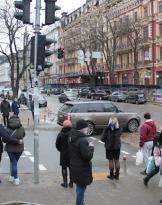M. is a thin man. The beard of a month frames a sad and gray face like the wall. He has a dark look that hides an abyss, a deep wound. The second time we meet, she shakes a little and a breach opens in her silence. He takes confidence and starts talking.
November 2012 (area north-east of Damascus): before the war passes there, M. sends his wife and children away. He stays because the barber shop and the house are his whole life. He has to work to support the family.
If he finds them at home suddenly. They are the "moderate militia for freedom and democracy" of the Free Syrian Army. Those of the Arab spring, friends of friends ...
He is immediately beaten to blood on charges of being a Shia, an infidel. He is actually Sunni, but they do not believe him. Absurd days of beatings and torture begin.
He discovers the bandages from the feet and shows us the marks on the ankles (photo). They tortured him with electricity to extract a confession.
To alleviate the pains M. could confess what is not. If he had, they would have killed him on the spot as happened to other neighbors.
He continues to deny, but his torturers do not believe him. After weeks of beatings and death threats, the infamous FSA decide to do away with it. They take him to the street, they incapacitate him and tell him to pray. The head of the band passes by when the AK who is pointing at his forehead is about to shoot. He raises the barrel of his rifle as the shot that touches his head starts.
"He's a Sunni, what the fuck are you doing!" - he exclaims.
The local leader of the militia is a local man and recognizes him. The escaped execution is the beginning of another hell: they occupy it and reduce it to slavery. He is forced to serve between physical and moral violence of all kinds.
Meanwhile, in this area of Damascus daily life is rung by summary executions. The bodies of the captured soldiers are thrown into the garbage cans after torture. All the "infidels" are systematically eliminated: Shiites, Alawites, Druses, Christians ... There is a precise, pre-arranged plan.
The militiamen are local Syrians but mostly foreign, mostly Moroccans and Tunisians. No Europeans. He recognizes almost all the Syrians, because they were his clients.
M. stops petrified. An image, a memory, something upsets him. His voice becomes angry, almost bad. He says those beasts were not true believers: they drugged, got drunk and sodomized each other. All in his wedding bed ... The modesty and the presence of customers in the store prevent him from saying further. The physical violence he suffered was lost in his dull gaze, frozen in a deep hatred and in a contracted posture.
He resumes talking and says that the upper floor of the house had become an armory.
The weapons are many and very modern. It is not known who supplied them but the militiamen are better equipped than the army. Sniper rifles with nocturnal optics kill victims for months. Families stop sending children at school because they are increasingly becoming the targets of snipers on the rooftops. The moderate militiamen have fun for 9 months, how long the occupation of this part of Damascus lasts.
The party ends one day. The army arrives and the militiamen of the Free Syrian Army flee. They take M. with them, but he manages to disengage. He heads for the Syrian military. Waves the white undershirt, reaches them and finds escape.
Shop and house have become rubble. However, he manages to get the family to start again. Life in Damascus slowly resumes.
We ask if he ever believed in the 2011 protests.
He replied that the revolution was organized from outside. It was clear from the beginning that it was a trap.
When he talks about what he feels for the militia, the darkness is back in his eyes. They lose light and life. Behind his gray face he can not find forgiveness for what they did to him. It speaks of death, of revenge, of an endless hatred. It is the war desired by others.
(photo: Online Defense)











